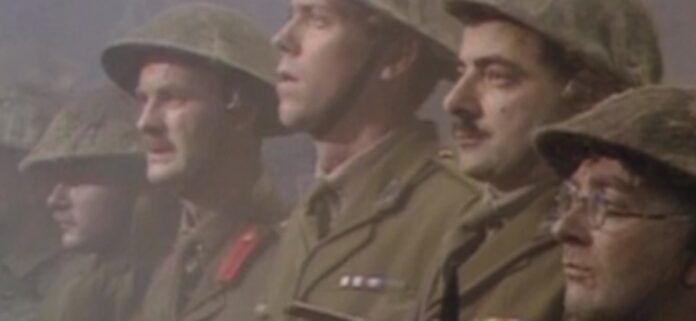Blackadder Goes Forth
Series 4, Episodes 4–6: “Private Plane,” “General Hospital,” and “Goodbyeee”
Original airdates: Oct. 19, 26, and Nov. 2, 1989
Noel: I find “Private Plane” oddly hilarious.
Flashheart’s larger-than-life character, portrayed by Rik Mayall, commands attention without overwhelming the scene.
Mayall’s performance encourages Rowan Atkinson to play Blackadder more subtly, and the dynamic works well.
Flashheart’s immense ego and Blackadder’s simmering envy create a balanced interplay.
What also strikes me in “Private Plane” is the idea that being a POW teaching home economics to German girls is more attractive than enduring the trenches.
Anything to escape the horrors of war. But…
“Goodbyeee,” guys, it really hits me hard. I’m holding back tears as I type this.
Some of it, of course, stems from the absolute finality of this death, unlike the previous episodes.
Those were broad, low-stakes comedies (as we discussed last week). Edmund has no escape here.
He attempts insanity, but no one believes it because, well, “Who would have noticed another madman around here?”
The weight of impending doom dawns on everyone save for the cowardly Melchett.
It dawned on Edmund long ago, and it finally becomes apparent to George and Baldrick (Hugh Laurie and Tony Robinson deliver intense performances).
Even Darling’s safe perch is pulled out from under him, breaking his smug superiority so thoroughly that even Edmund can’t muster a truly snide word upon his arrival.
They’re all doomed, and they all realize it. So do we. And it’s horrific.
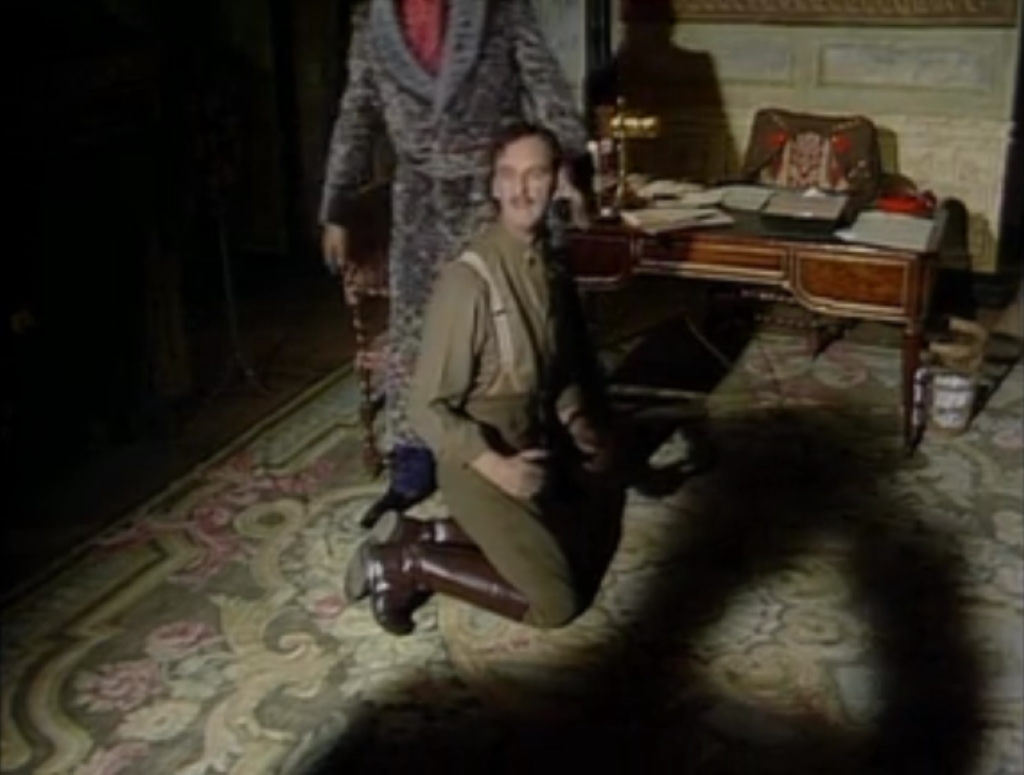
Andy: My house got a bit dusty, too, when I watched “Goodbyeee,” and the dustballs are cropping up now as well.
For a seemingly lighthearted but insightful comedy to transform into a profoundly moving commentary on a relatively recent national tragedy is truly remarkable.
The Great War, which claimed around 800,000 lives in the United Kingdom, left a lasting impact.
This isn’t just a satire of the powerful, however harsh; it’s filled with genuine scorn.
Even the officious Darling is portrayed with sympathy when his fate is revealed (in a scene with a superb performance by Tim McInnerny), but there’s no such moment of humanization for Melchett, one of the architects of this senseless slaughter. That speaks volumes.
I conducted research on several websites to find the estimate, and I discovered a range of answers, typically between ~750,000 and ~1.1 million, with variations based in part on the specific British political entity being referred to.
Rarely in the past has Blackadder been so explicit in highlighting the parallels between historical absurdities and their contemporary counterparts.
When Edmund explains the delicate power balance that shaped pre-1914 Europe, it’s a clear allusion to the alignment of the Cold War, which was in its twilight (just one week after the original airing of “Goodbyeee,” the Berlin Wall fell).
However, this doesn’t mean that “Goodbyeee” loses its humor.
Impressively, it effectively balances each recollection of a bygone era or yearning for a fading future with customary humor.
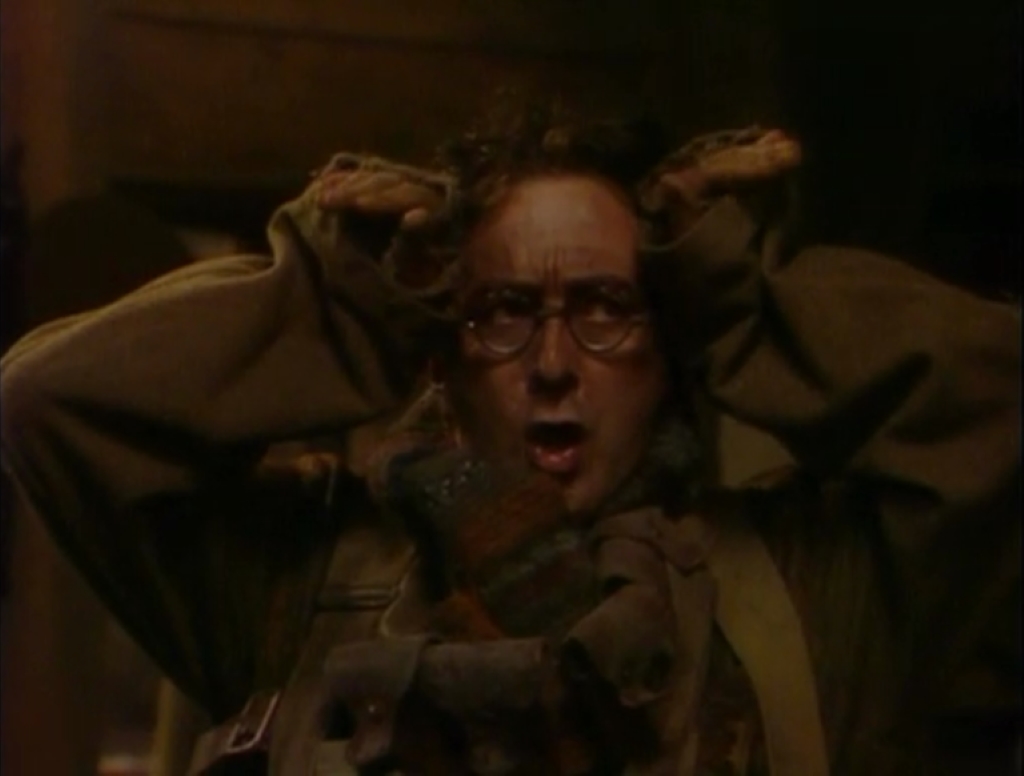
For instance, the crystal-clear explanation of 20th-century geopolitics is delivered by a man with underpants on his head and pencils stuck up his nostrils.
This doesn’t suddenly become a Very Special Blackadder episode, making it exceptionally memorable.
“Private Plane” and “General Hospital” both deliver humor effectively.
The presence of Flashheart in the former episode is evident in the enthusiastic audience response, while in the latter, the repeated use of Stephen Fry’s supercilious baritone to say “pooh-pooh” is one of my favorite gags in the series.
Nevertheless, it’s “Goodbyeee” that will leave a lasting impression.
Les: None of you who had seen Blackadder before this roundtable warned me that this show would bring tears to my eyes.
It’s mainly for the reasons you both mentioned earlier, but what truly hits me is the calm before the storm.
Waiting is the toughest part, as Tom Petty said, and our central trio in the bunker takes the dread we’ve experienced for five episodes to its peak.
George cheerfully talks about how much fun it was when all the lads from the Trinity Tiddlers enlisted together, but then he recites the list of fallen comrades until he realizes he’s the sole survivor.
He momentarily falters before his natural cheerfulness reasserts itself, but as the night goes on, it becomes increasingly challenging to maintain.
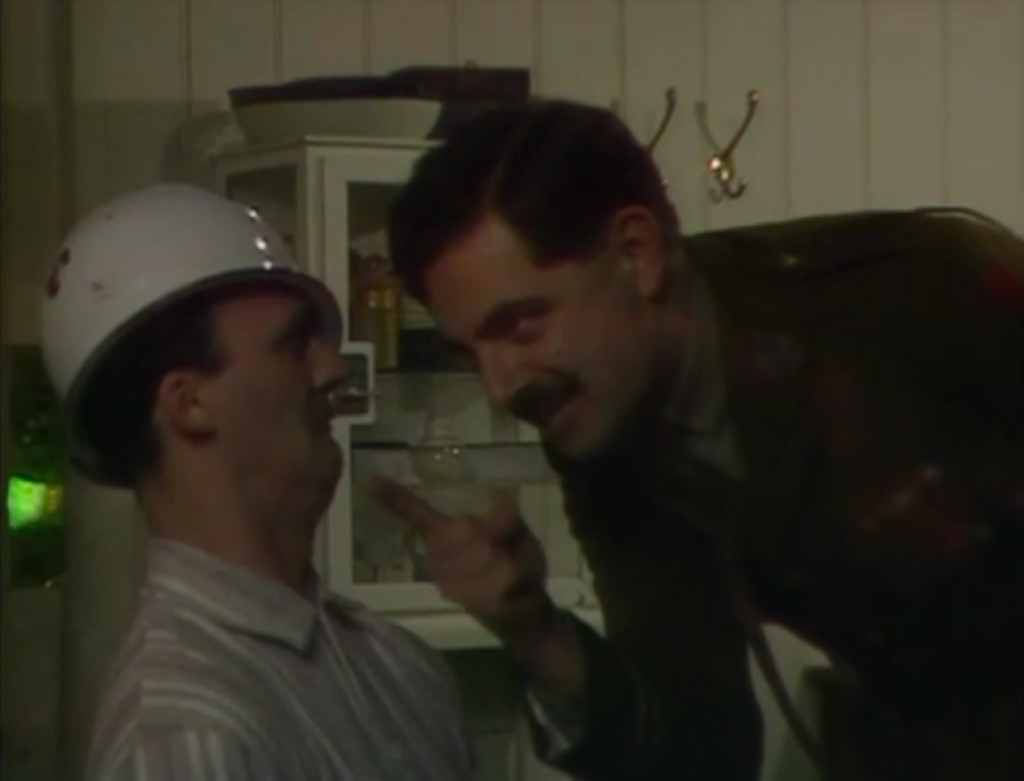
And then there’s Baldrick, vehemently denouncing the war’s pointlessness, and for once, it’s not due to his usual obliviousness.
While he humorously explained the war as starting because “some bloke called Archie Duke shot an ostrich ’cause he was hungry,” having lost all of his verminous friends, even poor Neville, the hamster, he’s the only one to ask the simple question: “Why would it be stupid just to pack it in, sir, why?”
Noel, you specifically praised Tony Robinson’s performance at the end of Blackadder the Third, but this may have been his finest moment, as his simplicity makes him the purest voice of reason.
But I found Edmund the most intriguing. Like George, I spent a good portion of this season wondering why Blackadder, a character known for his self-centeredness (coming from a long line of similarly narcissistic individuals), would choose a career in the military.
His answer, that at the time he enlisted, the most formidable opponent available was armed with a mango, was not only consistent with his character but also reflects the impact of World War I on Britain’s sense of invincibility.
Britain was accustomed to exerting dominance over other nations through its military might, expanding its empire without significant challenges.
However, for the first time, they faced a formidable adversary in Germany.
This marked a decline in British imperial power, and the fall of the British empire began in those trenches.
Edmund chose what he believed was the path to the easiest glory and found himself trapped.
Regarding the other episodes, I have a lesser fondness for the Flashheart character, as I find him a bit too bombastic for the show’s typically sardonic tone (I encountered similar issues with Lord Dougal McAngus in the distant past, in “Born To Be King”).
Nonetheless, I always welcome Miranda Richardson’s appearances, even if they are brief cameos.
“General Hospital,” in particular, offers a great example of Blackadder’s humor, with moments like Melchett sending Darling undercover after he’s shot in the foot and the eventual revelation that George’s whale omelet-thickness was the security leak all along.
(Additionally, in a delightful coincidence, our friend Robert Sullivan just ranked “Goodbyeee” as the 15th best sitcom episode in his list of top 100 sitcom episodes last week.)
Cory: It appears I may be a bit less emotional than the rest of you.
My reaction to “Goodbyeee” wasn’t as strong.
Nevertheless, it doesn’t diminish the episode’s effectiveness, and I still found it moving.
Perhaps reading your thoughts before watching the episode influenced my perspective. The perils of going last (and being a bit of a slacker), it seems.
In any case, what struck me about “Goodbyeee” is how it served not only as a finale for this particular series but also for the entire show.
While we know there’s more to come, and the characters have evolved, the finale took great care to provide moments for all the characters and actors.
After numerous episodes of divisive schemes and posturing, it was heartening to see the characters coming together, even if it was due to the dire circumstances.
On a related note, I’m curious to know if anyone, in the comments, on Twitter, or elsewhere, feels that the show didn’t quite earn the shift to a more serious tone in the second half of “Goodbyeee.”
It seems that most of you believe it did, and I mostly agree with that sentiment, considering that “Goes Forth” maintained a more serious and earnest tone throughout, despite its comedic elements.
Nevertheless, I wonder if there are different interpretations of the episode.
We’ve dedicated a lot of attention to the finale, and rightly so, but I want to highlight that “Private Plane” and “General Hospital” were also quite enjoyable.
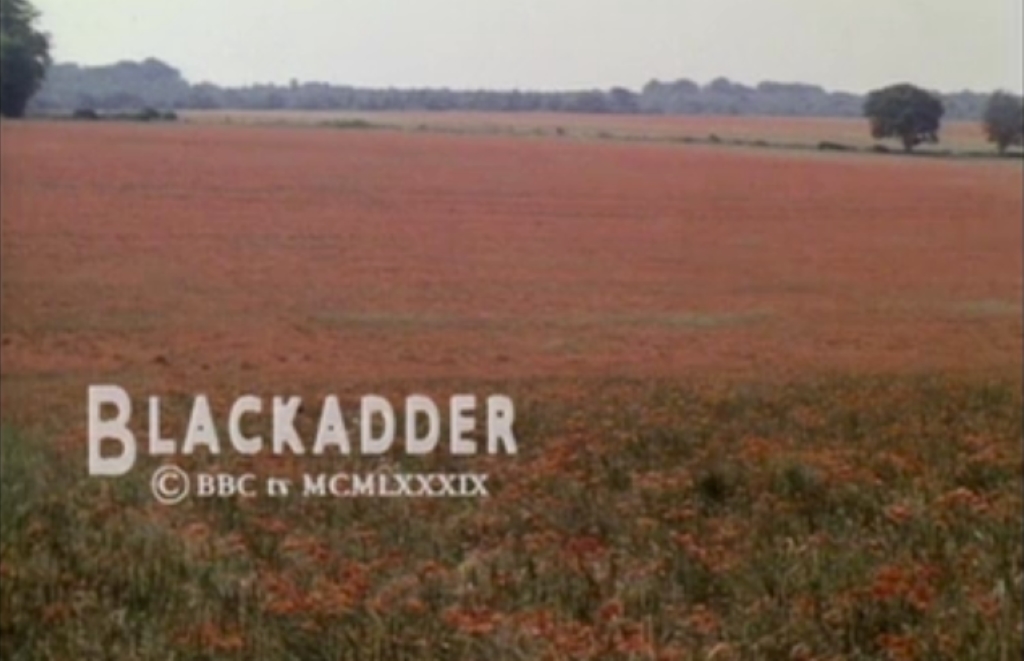
“Private Plane” may have been silly, but it was funny, and I was pleasantly surprised that the half-cocked mole plot worked better than expected, thanks to the palpable chemistry between Rowan Atkinson and Miranda Richardson.
Oddly enough, I found myself laughing at the playful jabs at Oxford, even though I have no particular issues with or in-depth knowledge about Oxford.
This laughter, I believe, speaks to the strength of the writing and the performances.
Although we and the series haven’t officially concluded our journey here, I must say that I’m genuinely pleased I stuck with you all.
While Blackadder may not make it onto my personal comedy Mount Rushmore, I completely grasp how and why it earns that place in the hearts of others.
What truly stands out about Blackadder is the seamless synergy between strong writing and exceptional performances from series two onward.
You Might Be Interested: Roundtable Review: Blackadder the Third, “Dish and Dishonesty,” “Ink and Incapability,” and “Nob and Nobility”


